|
|
|
Sort Order |
|
|
|
Items / Page
|
|
|
|
|
|
|
| Srl | Item |
| 1 |
ID:
163271


|
|
|
|
|
| Summary/Abstract |
Many norms develop in the absence of clear templates for how to implement them. I argue that, even under these conditions, individuals and organizations can still successfully push for new norms, along with attendant changes in state practices. They do so through a mode of action that I term communicative entrepreneurship. Unlike norm entrepreneurs, communicative entrepreneurs do not project normative or technocratic certainty. They use nudges and networking strategies to trigger debates that define the contours of emerging normative scripts. I illustrate this dynamic with the case of the Inter-American Court of Human Rights, which became interested in regulating the use of its jurisprudence by local judges. Lacking a script amenable for diffusion, it triggered a dialogue with national courts to jointly regulate citation practices, and more generally, judges’ obligations with respect to international human rights jurisprudence. Using original interviews and other sources, I trace the impact of communicative entrepreneurship on the behavior of Mexican and Colombian high courts. I show that it led to the development of new judicial decision-making standards in two very different contexts and therefore bolstered the authority of the Inter-American Court.
|
|
|
|
|
|
|
|
|
|
|
|
|
|
|
|
| 2 |
ID:
163282
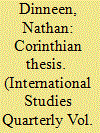

|
|
|
|
|
| Summary/Abstract |
David Hume famously argued that the idea of the balance of power existed in antiquity. However, he rests his case almost entirely on the deeds of the ancient Greeks. This evidence, by itself, only shows that balance of powers emerged as an outcome of competitive Greeks warring with each other for power and prestige. It does not demonstrate the existence of the balance of power as a social convention of the inter-polis society or as a goal of a regime's foreign policy. I argue that a focus on the speeches in the political histories of Herodotus, Thucydides, and Xenophon bears out his claim. Attention to these speeches rebuts Hume's main critics of the last century—that is, international relations scholars belonging to the English School. In particular, the speeches of the Corinthians from prior to the Persian Wars to the aftermath of the Peloponnesian War reveal an enduring thesis of their foreign policy: that imperial ambitions and leveling tendencies, such as those of Athens, Sparta, and Thebes, should be countered in order to prevent a tyrant city from emerging within the society of Greek city-states.
|
|
|
|
|
|
|
|
|
|
|
|
|
|
|
|
| 3 |
ID:
163272


|
|
|
|
|
| Summary/Abstract |
Why do governments and militaries publicly condemn and prosecute particular forms of abuse? This article explores the Sri Lankan government's decision to promote limited legal accountability for state-perpetrated rape committed in a country otherwise renowned for widespread impunity. We argue that rather than representing a turn against impunity, the symbolic stance against conflict-related sexual violence in a small number of high-profile cases served an explicitly politico-military agenda. The state deployed legal accountability in specific cases to garner political legitimacy among key domestic audiences. The Sri Lankan government drew on the symbolism of female victimhood to mobilize support at a time when support for military counterinsurgency was waning. We show that governments can uniquely instrumentalize sexual violence cases to establish moral authority and territorial legitimacy. Through an examination of the domestic legal response to state-perpetrated human rights abuses, we illustrate the many ways in which women's bodies—and the law—can be mobilized in war to serve military ends.
|
|
|
|
|
|
|
|
|
|
|
|
|
|
|
|
| 4 |
ID:
163274


|
|
|
|
|
| Summary/Abstract |
Why do some rebel groups resort to terrorism tactics while others refrain from doing so? How rebel organizations finance their rebellion creates variation in the extent to which terrorism undermines their legitimacy. Rebel organizations pay attention to the legitimacy costs associated with terrorism. Organizations that rely primarily on civilian support, and to a lesser extent on foreign support, exercise more restraint in their use of terrorism. Rebels who finance their fight with lootable resources such as gems or drugs are least vulnerable to the costs of alienating domestic supporters. Thus, they are more likely to resort to terrorism and to employ more of it. The article elaborates this legitimacy-cost theory and tests it using new data on Terrorism in Armed Conflict from 1970 to 2007. We find robust support for the hypothesis that groups who finance their fight with natural resources are significantly more likely to employ terrorism (though not necessarily to conduct more deadly attacks) relative to those who rely on local civilian support. Groups with external sources of financing, such as foreign state support, may be more likely to engage in terrorism than those who rely on local civilians, but not significantly so.
|
|
|
|
|
|
|
|
|
|
|
|
|
|
|
|
| 5 |
ID:
163284
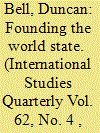

|
|
|
|
|
| Summary/Abstract |
Herbert George Wells was one of the leading public intellectuals of the first half of the twentieth century. Most famous today as a founder of modern science fiction, he was once known throughout the world as a visionary social and political thinker. Questions of global order occupied a central place in his work. From the opening decade of the century until the close of the Second World War, he campaigned tirelessly for the creation of a world state, which would act as a guarantor of universal peace and justice. Yet, scholarship on Wells pays insufficient attention to the complex and conflicted nature of Wells's early views about how to build a world state. In particular, it neglects the tensions between his advocacy of a New Republic, formed by the unification of the English-speaking peoples, and his support for liberal imperialism. I analyze the development of this theme in Wells's political thinking during the years before WWI, a formative period in his intellectual life. I demonstrate how his conceptions of race, empire, and Anglo-American union shifted over time, show how his political arguments connected to his underlying views about social explanation and language, and highlight how his interpretation of the United States profoundly influenced his ideas about world order.
|
|
|
|
|
|
|
|
|
|
|
|
|
|
|
|
| 6 |
ID:
163270
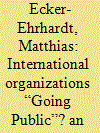

|
|
|
|
|
| Summary/Abstract |
The last few decades have seen a dramatic increase in the public communication efforts of international organizations (IOs). They target an expanding audience, including journalists, experts, activists, and citizens. Their communication departments have grown to more effectively produce and disseminate messages, evaluate their impact, and develop long-term communication strategies. I examine this trend for forty-eight IOs between 1950 and 2015. Based on an event history analysis of structural reforms, I argue that two causal mechanisms most consistently explain why IOs go public: First, normative change toward greater institutional transparency encourages the democratic membership of IOs to push for reforms in order to improve the provision of public information on IO decisions and policy programs. Second, public protest and scandals substantially increase organizational demands for self-legitimation. As a result, IOs reformed communication in order to more effectively generate public support. However, I find limited evidence that IO mandates to promote social change—by teaching norms and knowledge—can account for observed reforms to their communication structures.
|
|
|
|
|
|
|
|
|
|
|
|
|
|
|
|
| 7 |
ID:
163287
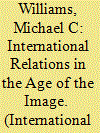

|
|
|
|
|
| Summary/Abstract |
Images pervade contemporary politics. Across the globe, people receive more and more of their information and impressions about politics through media outlets saturated with images, while political leaders show increasing skill in melding popular culture and political power. Understanding the aesthetic dimensions of world politics is thus of paramount importance. This article seeks to deepen our understanding of the historical and political relationship between images and international theory. Contrary to the predominant view, it argues that, far from being absent from international relations (IR), aesthetics concerns were at the heart of the intellectual politics in which the postwar study of international relations developed. The article shows that suspicion toward aesthetics in IR is not simply the result of ignorance about emotions or images in politics, nor of methodological myopia. Instead its roots are political and lie in the powerful political constellation of Cold War liberalism, social science, and the foreign policy strategies and political struggles of the Cold War. This history has largely disappeared from the self-understanding of the field, but its recovery is essential in appreciating the place of aesthetics in international relations theory and addressing the challenges posed by aesthetics in contemporary world politics.
|
|
|
|
|
|
|
|
|
|
|
|
|
|
|
|
| 8 |
ID:
163280
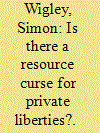

|
|
|
|
|
| Summary/Abstract |
Scholarship on the political resource curse overwhelmingly focuses on whether oil wealth hinders the transition to democracy. In this note, I examine whether it oil wealth negatively affects the private rights of the individual. I argue that petroleum-rich governments are subject to less pressure to protect freedom of movement, freedom of religion, the right to property, and freedom from forced labor. In addition, they can use the windfall at their disposal to finance the enforcement of laws that restrict those rights. Based on a panel of 162 countries for the years 1932–2003, I find that petroleum wealth is negatively associated with private liberties. Using mediation analysis, I also find that most of the impact of oil wealth on private rights arises independently of its impact on the level of democracy. This indicates that the scope of the political resource curse extends beyond representation.
|
|
|
|
|
|
|
|
|
|
|
|
|
|
|
|
| 9 |
ID:
163273
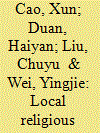

|
|
|
|
|
| Summary/Abstract |
This article studies how local religious institutions mediate the effect of interethnic inequality on local violence. Focusing on the case of Xinjiang, China, we argue that local religious institutions decrease violence caused by local grievances. They do so in two ways: first, they provide local public goods; second, they provide an “information bridge” between the local population and the government, allowing for nonviolent management of potential discontent. We evaluate our claims with a county-level database of incidents of ethnic violence in Xinjiang, China. We measure local interethnic inequalities using education indicators from census data and the strength of religious institutions using local mosque density. We find a conflict-dampening effect of religious institutions: a higher level of interethnic inequality is associated with increased ethnic violence only in areas with low and medium levels of mosque density. This article contributes to the literature of civil conflict, ethnic violence, and political and social unrest by revealing how local institutions mediate the effect of grievances on violence.
|
|
|
|
|
|
|
|
|
|
|
|
|
|
|
|
| 10 |
ID:
163281


|
|
|
|
|
| Summary/Abstract |
I argue that international trade increases military enlistment in the United States. Trade-related job losses reduce economic opportunities in local labor markets, and the government responds by increasing military recruitment efforts in those counties. This dynamic challenges conventional accounts of globalization, which tend to overlook the local impact of free trade and only examine the traditional welfare policies that governments offer to compensate “trade losers.” This study analyzes an original, county-level data set on army enlistment and trade-related job losses from 1996 to 2010. The results suggest that a trade shock of one thousand job losses is associated with a 33 percent increase in army enlistment in the median county. To illustrate the causal mechanisms that link free trade to army enlistment, this study also presents a case study based on original interviews in Catawba County, North Carolina, a county particularly impacted by trade liberalization.
|
|
|
|
|
|
|
|
|
|
|
|
|
|
|
|
| 11 |
ID:
163279


|
|
|
|
|
| Summary/Abstract |
Many international organizations channel financial contributions of their member countries through other international organizations to implement their programs and activities. In this context, the second step of the delegation chain is often costly and—at least seemingly—an easily avoidable duplication of a previous one. We examine the puzzling phenomenon of double delegation in the context of European aid. We argue that governments engage in double delegation in order to strengthen the role of the European Union (EU) as a multilateral donor agency. This leads to an increase in the flow of resources that, at times, exceeds what the Commission can effectively handle alone. Delegating aid to other organizations helps the Commission solve this capacity problem, but it also reduces its control over how the resources are spent. Consequently, the Commission must exercise judgment about which projects it delegates to other international organizations. Our quantitative and qualitative evidence shows that double delegation is more likely where the Commission's capacity as an aid donor is low and where EU members have no strategic interests at stake. We also show that the Commission tries to mitigate the loss of control by earmarking the delegated aid projects more tightly, notably when member preferences are heterogeneous. The results provide a new way of thinking about international delegation and bureaucratic politics in international organizations. Delegation problems may occur even if the interests between the principal and the agent align. Our approach highlights why this happens and how actors try to minimize the costs of this understudied type of agency slippage.
|
|
|
|
|
|
|
|
|
|
|
|
|
|
|
|
| 12 |
ID:
163269


|
|
|
|
|
| Summary/Abstract |
How does economic interdependence shape political relations? We show a new pathway to support a commercial peace in which economic interdependence changes strategies for conflict management. The uncertainty arising from political disputes between countries can depress trade flows. As states seek to protect trade from such negative effects, they are more likely to bring their disputes to legal venues. We assess this argument by analyzing why countries bring cases to the International Court of Justice (ICJ). Using data on 190 countries from 1960 to 2013, we find that countries are more likely to file ICJ cases against important trading partners than against states with low levels of shared trade. We conclude that economic interdependence changes the incentives for how states resolve their disputes.
|
|
|
|
|
|
|
|
|
|
|
|
|
|
|
|
| 13 |
ID:
163277
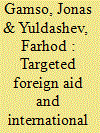

|
|
|
|
|
| Summary/Abstract |
Faced with the failure of traditional immigration controls, policymakers in the United States and Western Europe increasingly look to foreign aid to reduce migrant inflows. Some analysts expect assistance to improve living standards in source countries, thereby deterring residents from moving abroad. While this idea makes intuitive sense, research on aid and migration shows mixed results: some scholarly work supports aid-based migration policies, but other analyses suggest that aid actually enables migration by providing individuals with resources that facilitate movement across borders. We suggest that this tension in the literature reflects a failure to distinguish between different types of foreign aid. Drawing on recent work demonstrating the heterogeneous effects of various aid projects, we posit that governance aid should deter emigration by enhancing government capacity and alleviating political push factors; in contrast, economic and social aid should enable migration by increasing individuals’ means and capabilities to move. We test our hypotheses on a panel of 101 developing countries spanning twenty-five years (1985–2010). We find that governance aid does reduce emigration rates from developing countries, while other types of aid appear not to affect migration.
|
|
|
|
|
|
|
|
|
|
|
|
|
|
|
|
| 14 |
ID:
163289
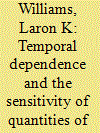

|
|
|
|
|
| Summary/Abstract |
Scholars of international relations increasingly use temporal dependence variables (polynomials or splines) to control for unmodeled duration dependence in nonlinear models (such as logit or probit) of events ranging from interstate conflict and civil war to sanctions imposition and trade agreements. I identify two inferential obstacles that are widespread to nonlinear models, and are exacerbated by the unique features of temporal dependence variables. First, compression causes the quantities of interest to be sensitive to the values in the counterfactual scenario (most notably, time). Second, presenting substantive effects calculated at one simulation scenario (such as an “average” scenario) grossly inflates the representativeness of that scenario and neglects the variability within the sample. The consequences of these problems range in severity from understating the magnitude of the substantive effects to deriving inferences that are wholly unrepresentative of the data. I offer a simple checklist. First, use the values observed in the data to generate in-sample quantities of interest. Second, plot those quantities of interest across the offending variable (for example, time) and interpret the relationship. Finally, provide a sense of the sample's variability in quantities of interest through simple summary statistics (such as mean, standard deviation, and range). These simple fixes provide much-needed transparency and act as a shield against scholars who might otherwise present misleading results.
|
|
|
|
|
|
|
|
|
|
|
|
|
|
|
|
| 15 |
ID:
163276
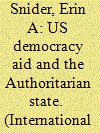

|
|
|
|
|
| Summary/Abstract |
A recent study commissioned by the United States Agency for International Development to assess the effectiveness of its spending on democracy in its programs worldwide found that such aid works—with the sole exception of programs in the Middle East. What explains this exception? I argue that previous studies on democracy aid pay insufficient attention to the fact that such programs often develop as negotiated deals. Because authoritarian regimes may choose how to accept assistance, democracy aid may reward economic interests tied to incumbent regimes. I explore these dynamics through case studies of US democracy programming in Egypt and Morocco
|
|
|
|
|
|
|
|
|
|
|
|
|
|
|
|
|
|
|
|
|